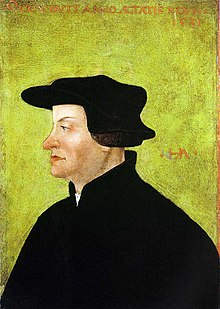Huldreich Zwingli
| Huldrych (Ulrich) Zwingli | |
|---|---|

Huldrych Zwingli as depicted by Hans Asper in an oil portrait from 1531 (Kunstmuseum Winterthur)
|
|
| Born |
1 January 1484 Wildhaus, Canton of St. Gallen, Swiss Confederation |
| Died | 11 October 1531 (aged 47) Kappel, Canton of Zurich, Swiss Confederation |
| Education |
University of Vienna University of Basel |
| Occupation | Pastor, theologian |
| Theological work | |
| Tradition or movement | Reformed, Zwinglian |
Huldrych Zwingli or Ulrich Zwingli (1 January 1484 – 11 October 1531) was a leader of the Reformation in Switzerland. Born during a time of emerging Swiss patriotism and increasing criticism of the Swiss mercenary system, he attended the University of Vienna and the University of Basel, a scholarly center of Renaissance humanism. He continued his studies while he served as a pastor in Glarus and later in Einsiedeln, where he was influenced by the writings of Erasmus.
In 1519, Zwingli became the pastor of the Grossmünster in Zurich where he began to preach ideas on reform of the Catholic Church. In his first public controversy in 1522, he attacked the custom of fasting during Lent. In his publications, he noted corruption in the ecclesiastical hierarchy, promoted clerical marriage, and attacked the use of images in places of worship. In 1525, Zwingli introduced a new communion liturgy to replace the Mass. Zwingli also clashed with the Anabaptists, which resulted in their persecution. Historians have debated whether or not he turned Zurich into a theocracy.
The Reformation spread to other parts of the Swiss Confederation, but several cantons resisted, preferring to remain Catholic. Zwingli formed an alliance of Reformed cantons which divided the Confederation along religious lines. In 1529, a war between the two sides was averted at the last moment. Meanwhile, Zwingli's ideas came to the attention of Martin Luther and other reformers. They met at the Marburg Colloquy and although they agreed on many points of doctrine, they could not reach an accord on the doctrine of the Real Presence of Christ in the Eucharist.
...
Wikipedia
